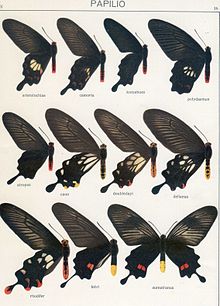Red-bodied swallowtail
| red-bodied swallowtail | |
|---|---|

| |
| Pachliopta hector | |
| Scientific classification | |
| Kingdom: | |
| Phylum: | |
| Class: | |
| Order: | |
| Family: | |
| Subfamily: | |
| Tribe: | |
| Genus: | |
| Species | |
|
About 46; see text | |
| Synonyms | |
| |
Red-bodied swallowtails or ruby swallowtail ( due to the color ) are butterflies in the swallowtail family, that belong to the genera Atrophaneura, Byasa, Losaria, or Pachliopta. They are generally found in Asia (Indomalayan realm).
Collectors have found the red-bodied swallowtails difficult to kill. Pinching the thorax, a method which kills most butterflies, is withstood and apparently only stuns the butterfly temporarily.[citation needed]
Life history
The eggs are simple. The larvae resemble those of other Troidini. Fleshy spine-like tubercles, often with red tips, line the caterpillars' backs, and their bodies are dark red to brown and velvety black or shades of grey with a pattern of black lines. They feed on species of Aristolochia and Thottea. Chrysalids are camouflaged to look like a dead leaf or twig. They are attached by a girdle and an anal pad. Adults are nectar feeding.
Many species of red-bodied swallowtails show aposematism,[1] and serve as models for Batesian mimicry. The biology of Pachliopta hector and Pachliopta aristolochiae are well studied.
-
Pachliopta hector egg
-
Pachliopta aristolochiae larva
-
Byasa alcinous pupa
Taxonomy
Species limits may be either narrow (many species - forma and subspecies raised to full or "good" species) or broad (fewer species - rank reduction) see Jürgen Haffer for a discussion.
Genera and species



Listed alphabetically within genera:[2]
genus: Atrophaneura Reakirt, [1865][2] (earlier considered as subgenus Atrophaneura but now raised to genus level)[3]
- Atrophaneura aidoneus (Doubleday, 1845) — lesser batwing
- Atrophaneura dixoni (Grose-Smith, 1900)
- Atrophaneura horishana (Matsumura, 1910) — aurora swallowtail
- Atrophaneura kuehni (Honrath, 1886)
- Atrophaneura luchti (Roepke, 1935)
- Atrophaneura nox (Swainson, 1822) — Malayan batwing
- Atrophaneura priapus (Boisduval, 1836) — Priapus batwing
- Atrophaneura semperi (C. & R. Felder, 1861)
- Atrophaneura schadenbergi (Semper, 1891)[4]
- Atrophaneura sycorax (Grose-Smith, 1885)
- Atrophaneura varuna (White, 1842) — common batwing
- Atrophaneura zaleucus (Hewitson, [1865])
genus: Byasa Moore, 1882 (earlier considered as subgenus Byasa but now raised to genus level)[3]
- Byasa adamsoni (Grose-Smith, 1886) — Adamson's rose
- Byasa alcinous (Klug, 1836) — Chinese windmill
- Byasa crassipes (Oberthür, 1893) — black windmill
- Byasa daemonius (Alphéraky, 1895)
- Byasa dasarada (Moore, 1857) — great windmill
- Byasa hedistus (Jordan, 1928)
- Byasa impediens (Rothschild, 1895)
- Byasa laos (Riley & Godfrey, 1921)
- Byasa latreillei (Donovan, 1826) — rose windmill
- Byasa mencius (C. & R. Felder, 1862)
- Byasa nevilli (Wood-Mason, 1882) — Nevill's windmill
- Byasa plutonius (Oberthür, 1876) — Chinese windmill
- Byasa polla (de Nicéville, 1897) — De Niceville's windmill
- Byasa polyeuctes (Doubleday, 1842) — common windmill
- Byasa rhadinus (Jordan, 1928)
genus: Losaria Moore, [1902] (earlier considered as subgenus Losaria but now raised to genus level)[3]
- Losaria coon (Fabricius, 1793) — common clubtail
- Losaria palu (Martin, 1912) — Palu swallowtail - has been regarded a subspecies of A. coon[5]
- Losaria rhodifer (Butler, 1876) — Andaman clubtail
- Losaria neptunus (Guérin-Méneville, 1840) — yellow-bodied club-tail or yellow club-tail
genus: Pachliopta Reakirt, [1865] (earlier considered as subgenus Pachliopta but now raised to genus level)[3]
- Pachliopta adamas (Zinken, 1831)
- Pachliopta aristolochiae (Fabricius, 1775) — common rose
- Pachliopta antiphus (Fabricius, 1793)
- Pachliopta atropos (Staudinger, 1888)
- Pachliopta hector (Linnaeus, 1758) — crimson rose
- Pachliopta jophon (Gray, [1853]) — Ceylon rose or Sri Lankan rose
- Pachliopta kotzebuea (Eschscholtz, 1821) — pink rose
- Pachliopta leytensis (Murayama, 1978)
- Pachliopta liris (Godart, 1819)
- Pachliopta mariae (Semper, 1878)
- Pachliopta oreon (Doherty, 1891)
- Pachliopta pandiyana (Moore, 1881) — Malabar rose
- Pachliopta phlegon (C. & R. Felder, 1864)
- Pachliopta polydorus (Linnaeus, 1763) — red-bodied swallowtail
- Pachliopta polyphontes (Boisduval, 1836)
- Pachliopta strandi (Bryk, 1930)
References
- ^ Kitching, Roger Laurence (1999). Biology of Australian Butterflies. Csiro Publishing. p. 131. ISBN 978-0-643-05027-3. Retrieved 5 July 2013.
- ^ a b Savela, Markku (16 Feb 2008). "Atrophaneura". Lepidoptera and some other life forms. nic.funet.fi. Retrieved 21 June 2013.
- ^ a b c d Häuser, Christoph L.; de Jong, Rienk; Lamas, Gerardo; Robbins, Robert K.; Smith, Campbell; Vane-Wright, Richard I. (28 July 2005). "Papilionidae – revised GloBIS/GART species checklist (2nd draft)". Entomological Data Information System. Staatliches Museum für Naturkunde Stuttgart, Germany. Retrieved 21 June 2013..
- ^ Gimenez Dixon, M. (1996). "Atrophaneura schadenbergi". IUCN Red List of Threatened Species. 1996: e.T2379A9436065. doi:10.2305/IUCN.UK.1996.RLTS.T2379A9436065.en. Retrieved 10 January 2018.
- ^ Hancook, D.L. (1982). A note on Atrophaneura palu (Martin) 1912. Papilo International. 1(3): 71-73
External links
- Flickr Correctly identified tagged photos
- Atrophaneura at Butterflycorner.net
- Pteron



